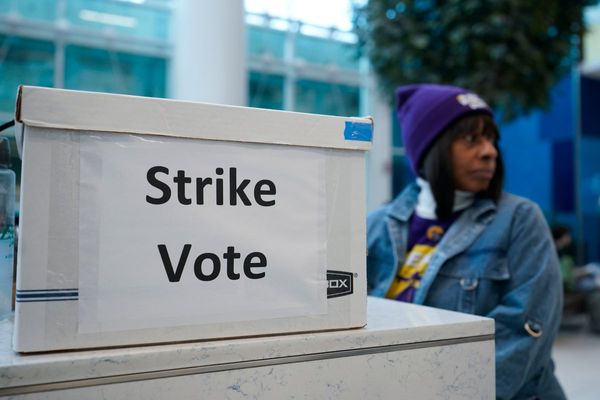The 2024 U.S. election has brought more than the usual surprises, from an assassination attempt to the incumbent president's abrupt exit. But for the stock market, a big question still hangs over the contest between Donald Trump and Kamala Harris: Will their policies help or hurt the tech companies that have driven gains in recent years?
So far, former President Trump has made clear his focus on reducing taxes and adding tariffs. Vice President Harris, meanwhile, has sharpened her pitch to voters, focusing on driving down consumer pricing. Each has blamed the other for such economic woes as inflation and a tight housing supply.
But as the candidates trade barbs, Wall Street and Silicon Valley still wonder whether to fear a Trump or Harris administration — or welcome it with open arms. The artificial intelligence community fears a new president might impose regulations that put the brakes on that sector's dizzying growth. Chipmakers fret over the future of a critical Taiwan chipmaking nexus and whether the U.S. will choke off tech exports to China. Support for cryptocurrencies also is an issue. And market watchers in general are pondering the age-old question of how much the next president will try to tax corporations.
Right now, Harris' quick ascension has left investors eager for more details.
"People were caught a little on their heels," said Mark Malek, chief investment officer at brokerage Siebert, in an interview with Investor's Business Daily. He added: "But now we're just starting to ponder what a Harris presidency would look like."
Also part of the equation is control of Congress, a key factor when voters hit the polls. Control of the White House and Congress by different parties will make legislation more difficult to pass. But the president can take unilateral actions on trade, antitrust and immigration.
Stock Market: Harris Shakes Up The 2024 Election
Harris' late entry into the race has supercharged Democrats' hopes of victory in November, upending an already drama-filled election cycle.
A potential Harris administration is likely to enact policies that reduce consumer debt, Alex Morris, president and chief executive at F/m Investments, told IBD.
F/m Investments is a strategy-focused investment firm with around $15 billion in assets under management. Morris cites Harris' co-signing of the Biden administration's student debt relief plan while vice president.
Fighting Costs Via Antitrust Actions
At a rally in Raleigh, N.C., last week, Harris proposed fighting rising consumer costs primarily through antitrust actions. She singled out the food production industry in her speech.
"I know most businesses are creating jobs, contributing to the economy and playing by the rules, but some are not, and that's just not right," Harris said. "We need to take action when that's not the case."
"We will help the food industry become more competitive, because I believe competition is the lifeblood of our economy," she went on to say. "More competition means lower prices for you and your families."
Morris also is watching for immigration policy changes that might affect labor-dependent sectors like energy and agriculture. A potential Trump administration would likely take a hard-line immigration approach, reducing the number of available migrant workers. A lack of labor could drive up costs for everyday staples and food.
Presidential Candidates Focus On Inflation
Both candidates are centering on inflation. In a recent discussion with Tesla Chief Executive Elon Musk on X, Trump slammed the Biden administration for inflation. He contends "people have been absolutely decimated" by inflation.
"We've got to get the prices down," Trump said.
But Harris agrees. During a stump speech in Atlanta, Harris said "families need relief from the high cost of living so that they have a chance not just to get by, but to get ahead."
"On Day One, I will take on price gouging and bring down costs," she said, though it was unclear how that would happen.
Meantime, the picture remains fuzzy for many investors in tech stocks. AI regulation, tariffs, semiconductor export controls, support for Taiwan and cryptocurrency policies are key concerns.
AI Push In Stock Market Takes Center Stage
Generative artificial intelligence has lit up the tech sector, delivering triple-digit gains for U.S. companies like Nvidia. But tech's newest battleground could also become a political combat zone. How will the candidates approach AI regulation?
Both Trump and outgoing President Joe Biden have been aggressive in pursuing Big Tech antitrust cases. Justice officials reportedly are now examining Nvidia.
"The big question and big trade here is autonomy and AI," Ivana Delevska, founder and chief investment officer at Spear Invest, told IBD. An asset manager, Spear Invest focuses on fundamentals, including technology investments like AI.
Because generative AI technology is still in its infancy, Delevska says governments must move fast to set up guidelines and laws. That would give tech stocks a clear framework within which AI development can continue.
"The general consensus is that a Republican administration would be more focused on implementing laws and regulations to allow testing or trials and even full-blown applications," Delevska said. She believes a potential Trump presidency would likely enact less restrictive rules than a possible Harris administration.
Delevska says this is a driving factor behind Musk's full-throated endorsement of Trump. Musk, the billionaire chief executive of Tesla and social media platform X, has hawked the use of AI throughout his companies. This includes the Grok AI chatbot and Full Self-Driving technology for Tesla vehicles.
Taiwan, And The Doomsday Scenario For Chipmakers
Geopolitical tensions around Taiwan pose another potential flashpoint for both candidates and the stock market in general. A Harris administration is likely to reaffirm support for the island. But Trump's comments that the self-governed island should pay the U.S. for protection from China have raised questions.
Delevska sees Trump's remarks on the island nation as a clear net negative for the region, particularly for chipmaking giant Taiwan Semiconductor Manufacturing, known as TSMC, and the industry by extension. TSMC is a critical cog in the chipmaking world, as it supplies semiconductors for major tech companies such as Nvidia, Apple, Broadcom and Advanced Micro Devices.
Microchips like those made by TSMC are used in everything from lamps and clocks to car seat controls. The chips were so critical that during the Covid-19 pandemic, automakers blamed microchip shortages for a supply crunch in vehicle production.
If the U.S. were to step back from defending Taiwan, "it's not in the best interests of anybody," Delevska said. "It will be negative for the chip space, sure, but the U.S. losing access to companies like TSMC won't just affect the chip space. It'll affect every product we use today."
Delevska says a lack of U.S. support for Taiwan would have disastrous consequences. But she sees that as unlikely, even under a potential Trump administration.
"It's a doomsday scenario, but with a very low probability," she said, noting that some comments may be political machinations or negotiation tactics. "Remember, there were indeed no wars during a Trump administration."
Export Bans Set To Continue For Tech Companies
Another potential stock market impact could come from chip and semiconductor technology export bans. The concept is finding traction with both Harris and Trump.
As fears over China's semiconductor prowess rise, the U.S. uses such restrictions to try to preserve its lead in fields that rely on chips. That includes advanced AI technology.
The Trump administration enacted heavy trade restrictions and tariffs focused on hobbling Chinese chipmakers. The Biden-Harris administration continued many of these bans and pursued its own.
The administration restricted exports to China of AI-centric and advanced chips from Nvidia and AMD, as well as semiconductor manufacturing equipment.
These moves make it likely that trade restrictions will continue regardless of which candidate wins the election. Delevska sees a negative effect on the chip industry.
Meanwhile, a long-term cutoff of the supply of chips to China could accelerate that country's development of homegrown chips. That could eventually shut off U.S. companies from a large market.
"In the U.S., companies do have access to better AI hardware here, but the question is how long that advantage lasts," Delevska said.
But bad news might be ahead for Big Tech regardless of who wins. The sheer size of tech giants is drawing scrutiny from both Republicans and Democrats over antitrust issues.
Trade, Tariffs And Taking On Tech
When the subject turns to tariffs and trade, the candidates take predictable stances in many cases. But each camp has some surprises up their sleeves.
Experts believe a potential Harris administration is unlikely to focus on sweeping new tariffs and will likely keep in place tariffs enacted by Trump and extended under the Biden administration.
Harris also is expected to raise pressure on tech stocks like Meta Platforms and Google-parent Alphabet. They see her targeting data privacy and user rights concerns. She also backs raising the corporate tax rate to 28% and favors a 25% tax on unrealized capital gains for the superrich. The latter could make a serious impact on tech company founders.
Trump has made clear he favors tax cuts and reductions, including extending lower tax rates enacted during his presidency. He also wants to reduce corporate tax rates further.
But others say things are not as they seem.
"There's a theory that Harris won't be good for tech and Trump will — but if you take their statements verbatim, it's not," Morris said. Morris says Trump's VP pick, Sen. JD Vance, R-Ohio, is striking an "isolationist, anti-tech" arc in recent speeches, and he calls it "the first time a Republican is anti-business."
Morris cites Vance's acceptance speech during the Republican National Convention in July. "We need a leader who's not in the pocket of big business," Vance said, "but answers to the working man."
Vance also called for "a leader who won't sell out to multinational corporations, but will stand up for American companies and American industry."
Morris says Harris reaches out to tech companies on core issues. Last year, Harris held a meeting with the heads of several tech firms developing AI.
Stock Market: Crypto Could Take A Backseat
As for the 2024 election's impact on cryptocurrencies, experts say the outlook is unlikely to change based on who wins, despite hype from Trump's embrace of crypto.
At a bitcoin conference in July, Trump vowed to create a "strategic reserve" of bitcoin. That came alongside a promise to fire current Securities and Exchange Commission Chair Gary Gensler, a crypto hard-liner.
Democratic reactions to crypto have been more mixed. Biden's nomination of Gensler to SEC chair has led to enforcement actions against platforms like Binance and Coinbase.
Meanwhile, a group of Democrats, including Rep. Wiley Nickel, D-N.C., are pushing for a more crypto-friendly stance, according to reports from CoinDesk and Politico. The lawmakers are hoping for a reset to the party's approach to crypto in a Kamala Harris administration.
But experts say markets will influence cryptocurrencies more than the policies of any one presidential candidate. Crypto's risk-on nature makes it more sensitive to the market's overall health and interest rates. That showed up in its dramatic swings alongside the market in August.
"(Crypto) is behaving like a megacap tech stock," said Siebert's Malek.
The Flip Side: Do Elections Really Matter To Stock Market?
But some experts say the presidency might not significantly impact investors' portfolios — or at least, not in the way they expect.
"I don't know how much you're going to love my answer," Emily Roland, co-chief investment strategist at John Hancock Investment Management, told IBD in an interview. "But over the last two administrations, if you made a guess about which industries would benefit, you'd probably be wrong."
Roland says the best stocks and assets in each presidency often do not reflect an administration's goals. In some cases they contradict.
A recent report by Hancock tracked returns for asset classes during the Trump presidency from Nov. 8, 2016, to Nov. 3, 2020, and the Biden presidency from Nov. 3, 2020, until June 30, 2024.
The report says tech companies, Chinese stocks and emerging markets were among the best stock market performers under Donald Trump. The S&P 500 Information Technology index averaged a return of nearly 28% a year, while the MSCI China Index was 16%. The MSCI Emerging Markets Growth Index gained just over 15%.
The report shows that under the Biden administration, the S&P 500 Energy index earned a 42% return, followed by the Bloomberg WTI Crude Oil subindex at nearly 36%. The S&P 500 Information Technology index grew more than 25%.
Follow Mike Juang on X at @mikejuangnews and on Threads at @namedvillage.







